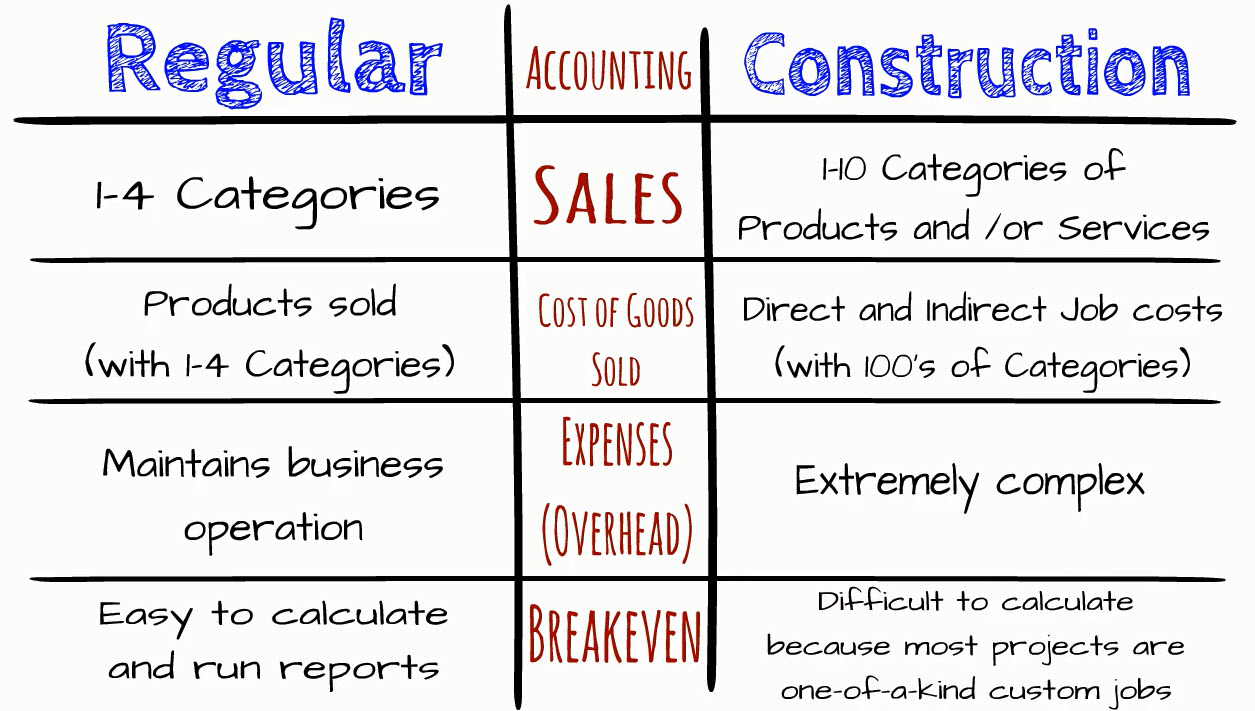Successful Construction Projects Start with Proper Construction Accounting Practices
Successful Construction Projects Start with Proper Construction Accounting Practices
Blog Article
Recognizing the Value of Building Audit for Successful Project Monitoring

Duty of Building Audit
Building accounting offers as the backbone of monetary administration in the building industry, ensuring that tasks are finished within spending plan and economic objectives are fulfilled. construction accounting. This specialized bookkeeping method addresses the one-of-a-kind challenges faced in construction tasks, consisting of differing job periods, changing expenses, and numerous stakeholders
Among the primary duties of building accountancy is to provide accurate price estimate and tracking throughout the job lifecycle. This assists in educated decision-making, allowing task managers to change sources and timelines efficiently. Furthermore, building and construction audit improves capital management by keeping track of accounts receivable and payable, hence guaranteeing that funds are available for prompt settlements to vendors and subcontractors.
Additionally, building and construction bookkeeping aids in compliance with sector policies and reporting demands. It gears up project supervisors with the required financial data to prepare detailed financial statements, which are essential for audits and financial testimonials. By keeping clear records, construction accounting promotes openness and responsibility, essential elements in building trust fund amongst stakeholders. Eventually, the function of building bookkeeping expands beyond simple financial monitoring; it is essential to calculated planning and operational efficiency, driving the success of construction projects in an affordable landscape.
Trick Components of Construction Audit

Budgeting develops an economic structure that guides task execution, enabling managers to designate sources successfully and prepare for possible economic difficulties. Accurate expense monitoring is essential for monitoring expenditures in real-time, helping to determine variances between predicted and real prices. This enables prompt adjustments to keep the project on spending plan.
In addition, financial reporting offers stakeholders with a clear image of the project's monetary wellness. Regular records, such as revenue and loss declarations and capital evaluations, help with informed decision-making and enhance openness among all events included.
Furthermore, conformity with market laws and bookkeeping criteria is vital. This makes sure that monetary methods are not just effective but additionally lawful, guarding the organization against legal consequences. By integrating these crucial elements, construction bookkeeping promotes an organized strategy to managing monetary resources, inevitably adding to the successful completion of building and construction jobs.
Advantages for Task Supervisors
Leveraging reliable building and construction audit practices offers project managers with a wide variety of benefits that boost both functional efficiency and economic oversight. One significant benefit is boosted budget management. Precise tracking of expenditures and profits permits job managers to monitor monetary efficiency in genuine time, guaranteeing tasks continue to be within budget and promoting timely adjustments when required.
Furthermore, building and construction audit simplifies capital management, making it possible for task managers to prepare for financial demands and optimize source allotment. By comprehending cash inflows and outflows, they can much better manage payments to staff members, distributors, and subcontractors, therefore staying clear of costly hold-ups.
In addition, robust accounting systems supply thorough reporting capacities. Job managers can generate records that supply understandings right into task productivity, price differences, and resource usage. This data-driven approach promotes notified decision-making, allowing supervisors to determine prospective issues proactively and apply corrective measures.
Finally, adherence to building and construction audit criteria guarantees compliance with regulative and legal requirements, minimizing the threat of fines or disputes. On the whole, reliable building accountancy equips project supervisors with the devices essential to drive job success, boost stakeholder confidence, and promote long-lasting business development.
Common Difficulties in Building And Construction Bookkeeping
Numerous task supervisors come across substantial difficulties in construction accountancy that can prevent job success. Among the key difficulties is the intricacy of tracking multiple task sites, each with distinct spending plans, timelines, and resource allowances. This needs careful interest to detail, which can be frustrating without a durable audit system in area.
Furthermore, rising and fall product costs and labor prices can make complex budget plan management, making exact forecasting difficult. Job supervisors usually struggle to resolve these prices with real expenditures, causing possible economic disparities.
In addition, building and construction accounting entails compliance with numerous laws, consisting of tax obligation obligations and labor regulations. Navigating these regulations can be daunting, specifically for supervisors that might not have a solid bookkeeping history.
Another considerable challenge is taking care of capital, which is essential in the construction sector. Hold-ups in invoicing, payments from customers, or unanticipated job changes can develop cash money circulation shortages, threatening the job's development.
Finally, reliable interaction in between project supervisors, accountants, and field groups is vital. Misunderstandings can result in incorrect financial coverage, even more complicating task management efforts. Attending to these difficulties proactively is vital for successful building audit.

Finest Practices for Effective Audit
While browsing the intricacies of building and construction audit can be difficult, taking on ideal practices can dramatically improve monetary administration and task success. One basic method is keeping accurate and timely records. Carrying out robust bookkeeping software application customized to building jobs can improve data entrance, invoicing, and coverage, conserving and lowering errors time.
Additionally, establishing a clear budget plan and normal surveillance against this spending plan are essential. Using a system of periodic financial evaluations allows job managers to identify variances early, facilitating prompt decision-making. It is also necessary to separate click this link job costs into indirect and direct categories, making it possible for clearer understandings right into success.
Another best practice includes cultivating open communication among all stakeholders. Routine updates and collaborative conversations about financial status can make sure everybody is aligned and informed. Educating personnel in construction-specific audit principles better enhances proficiency and precision.
Finally, making certain conformity with pertinent bookkeeping criteria and guidelines is non-negotiable. Regular audits and interior reviews add to transparency and accountability, constructing depend on with customers and stakeholders. By focusing on these ideal techniques, building and construction companies can maximize their accounting processes, eventually driving project success and monetary security.
Verdict
Finally, construction audit plays a crucial duty in making certain effective task monitoring by assisting in exact financial oversight and enhancing decision-making. By incorporating crucial elements such as expense estimation, capital administration, and compliance, task managers can browse usual obstacles and leverage finest techniques for effective accountancy. Ultimately, a robust building and construction accounting framework not just safeguards budget plan stability but additionally adds to the overall monetary health of building jobs, fostering lasting success within the sector.
By integrating these essential components, building accounting cultivates a structured approach to taking care of monetary sources, ultimately contributing to the effective completion of building and construction tasks.
Exact i loved this monitoring of incomes and expenses permits task supervisors to check economic performance in genuine time, making sure jobs stay within budget plan and assisting in timely modifications when required.
Project managers can generate records that offer insights into job profitability, cost variations, and resource utilization.Many task managers experience substantial difficulties in construction accounting that can hinder project success. construction accounting. Inevitably, a robust construction audit discover this info here structure not only safeguards spending plan integrity however likewise adds to the overall economic health of construction projects, cultivating lasting success within the sector
Report this page